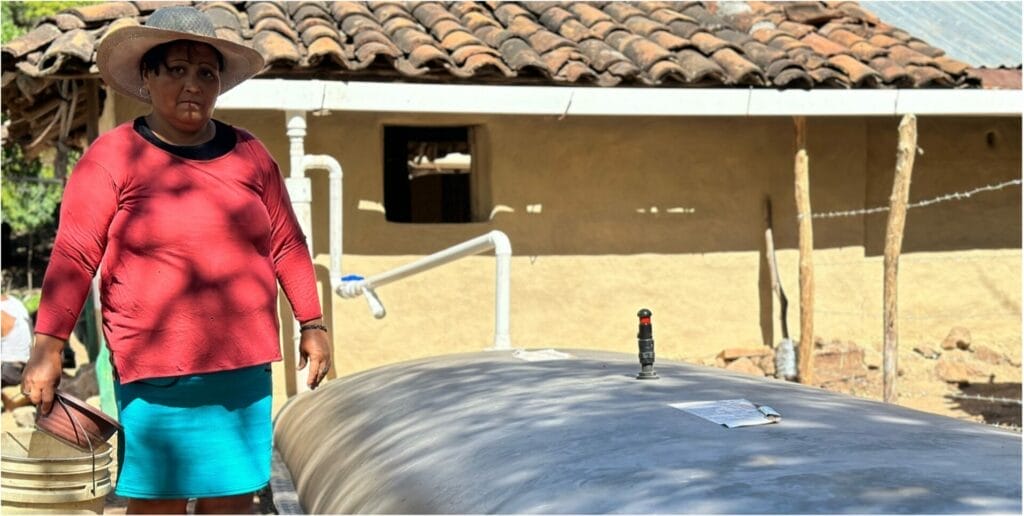Honduras, which is located within the Northern Triangle of Central America, faces civil unrest, political strife and widespread violence, leading to significant migration. Nearly 60% of the population lives in poverty.
The intersection of violence with crises like food insecurity and climate change worsens the overall humanitarian situation. In 2020, the COVID-19 pandemic and Hurricanes Eta and Iota exacerbated existing challenges, devastating rural livelihoods and food security. Extreme weather events have left many without basic necessities.
For over three decades, Global Communities has partnered with Hondurans to build stable, resilient communities. Our programs focus on disaster risk reduction, disease prevention, economic recovery and support for good governance. We address immediate needs while laying the foundation for sustainable recovery and preparing communities for future challenges.
63,600
Doses of vaccines administered in 2023, including COVID-19 and other essential vaccinations
234,688
Individuals gained improved access to clean drinking water through water system rehabilitations between 2020 and 2024
24,097
Insecticide-treated mosquito nets installed, and 4,048 homes received a cycle of indoor residual spraying to protect residents from malaria in 2024
111,982
People received information and education on effective handwashing and good hygiene practices from 2020 to 2024
Supporting Food Security and Resilience
To enhance household food security in the Dry Corridor of Honduras, Global Communities is implementing the Honduras Agricultural System Support (HASS) program, funded by the United States Agency for International Development’s Bureau for Humanitarian Assistance (USAID/BHA). HASS supports the resilience and disaster risk reduction efforts of 14,764 households across 50 communities in the departments of Ocotepeque, Copán, La Paz, Valle, Choluteca and El Paraíso.
This program focuses on improving food security and access to clean water through climate-smart agriculture and WASH initiatives. Many households benefit from multi-purpose cash transfers, which help them meet basic needs and enhance their livelihoods. Additionally, Global Communities implements the Women Empowered methodology to strengthen women’s political, social and economic leadership.
Enhancing HIV, Tuberculosis, and COVID-19 Response through Strategic Health Partnerships
Global Communities supports the Honduran National HIV Strategic Plan to achieve zero new infections, zero discrimination and zero AIDS-related deaths. This includes identifying new HIV-positive cases, providing treatment, distributing Pre-Exposure Prophylaxis (PrEP) and testing key populations for HIV. This project is carried out in collaboration with the Ministry of Health of Honduras and academic institutions, with a particular focus on sentinel surveillance clinics for sexually transmitted infections and comprehensive care services.
Beyond HIV care, this project focuses on successful treatment outcomes for tuberculosis (TB), including multi-drug-resistant TB. We enhance TB diagnosis with advanced molecular biology techniques and implement integrated HIV/TB services for comprehensive care. Our teams receive ongoing training, and we continue strengthening the Integrated Health Information System with new HIV surveillance capabilities. Additionally, we partner with the National Autonomous University of Honduras and the Ministry of Health to conduct meaningful scientific research.
To prevent COVID-19 infections, we deploy rapid response teams, establish oxygen-generating plants and provide essential medicines, mechanical ventilators and critical equipment to support hospital networks.
Eradicating Malaria through Strategic Health Initiatives
The Ministry of Health of Honduras aims to eliminate autochthonous cases of malaria by 2028. To achieve this, Global Communities is coordinating with authorities and technical teams at the Ministry of Health, along with a network of service providers in 12 departmental regions, benefiting over 200,000 people.
This initiative focuses on the prevention, surveillance and control of malaria, particularly among vulnerable populations such as women, children and young people. Most programming is concentrated in the Department of Gracias a Dios, with a special emphasis on the indigenous Miskito population.
Two of the most effective strategies to curb the spread of malaria are surveillance as an intervention and rapid information analysis to detect, diagnose and ensure compliance with treatment protocols for confirmed cases. The initiative also employs vector control methods, including intra-household residual spraying (IRS) and the installation of mosquito nets. Communication plays a vital role in promoting behavior change to prevent future infections.
This intersectoral health approach has become a model for collaboration, offering strong support to municipal governments, civil society and community-based organizations.
My love for my community encourages me to work as a volunteer health worker to prevent malaria as we work to eliminate the disease.
- Maritza, Malaria Eradication Project volunteer
Recent Programs
COVID-19 Community Vaccination Brigades
With financial support from the Centers for Disease Control and Prevention (CDC) and The Task Force for Global Health, Global Communities supported the Ministry of Health through the COVID-19 Community Vaccination Brigades project in Honduras. This initiative administered 63,600 doses of vaccines in the municipalities of Choloma, Villanueva and the Department of Cortés. The project provided critical support to the Expanded Program on Immunization, helping to protect the population by reducing vaccination gaps and improving access to essential vaccines. (Closed in 2023)
Emergency Water, Sanitation and Shelter Response to Natural Disasters
With support from the United States Agency for International Development’s Bureau for Humanitarian Assistance (USAID/BHA), Global Communities implemented the Honduras Emergency Water, Sanitation and Hygiene and Shelter (HEWS) program. HEWS addressed the immediate needs and early recovery of 211,090 people affected by Hurricanes Eta and Iota. The program provided access to clean water, sanitation and safe shelter while delivering multi-purpose cash assistance. Additionally, HEWS supported long-term economic recovery by assisting agricultural and non-agricultural livelihoods. (Closed in 2022)
Improving Watershed Management
In the Dry Corridor of Honduras, a region particularly vulnerable to climate change, Global Communities implemented the Watershed Management and Conservation component of the Dry Corridor Alliance Program in La Paz, Intibucá and Lempira from June 2017 to June 2021. Funded by the United States Agency for International Development (USAID) and the Government of Honduras, this initiative worked with national, local, and regional governments as well as local communities and water organizations to reduce land degradation and reforest watersheds. These efforts ensured sustainable access to water for consumption and irrigation. As a result, 106,000 hectares of land are now under improved management, benefiting 40,000 families. Additionally, 310 local water management organizations were strengthened, and 75 forest protection groups have been trained and equipped for long-term conservation. The program established 10 water quality laboratories and 45 hydroclimatic stations to support evidence-based watershed management and decision-making. (Closed in 2021)
Health Assistance & COVID-19 Response
Through the Health Assistance and COVID-19 Emergency Response (HACER) program, Global Communities enhanced municipal capacity in Cortés and the Dry Corridor to prevent and respond to the COVID-19 pandemic. Over nine months, from July 2020 to March 2021, HACER provided critical health and WASH assistance to 122,147 people. Key activities included logistical support for municipal response teams, mobilization of community health volunteers and dialogue sessions with community members to assess specific COVID-19 risks. HACER also established localized response plans linked to municipal efforts.
After Hurricanes Eta and Iota, some program activities pivoted to address the needs of those displaced by the storms, including providing hygiene supplies in collective shelters. These efforts were coordinated with the United States Agency for International Development’s Bureau for Humanitarian Assistance (USAID/BHA). (Closed in 2021)
Combating the Spread of Zika
In response to the Zika virus outbreak in Honduras, Global Communities implemented the Nuestra Salud (“Our Health”) program from 2016 to 2019. This initiative focused on strengthening community engagement in health and supporting local systems in the fight against Zika. Working closely with the Honduran Health Secretariat, the program mobilized a rapid response that aligned with existing health systems and policies, effectively expanding efforts to mitigate the spread of the virus. (closed in 2019)
When we received the cash transfer, it was a day of great joy for all of us, because it helped us solve some of our needs. My girls were excited because we were able to have food.
- Rosy, HASS program participant
Our Work in Honduras
Early Recovery & Market Systems
Advancing Market-Based Recovery
Food Security & Agricultural Livelihoods
Promoting Post-Emergency Food Production
Shelter & Settlements
Temporary Homes for Dignity, Safety and Privacy
Governance
Strengthening Civil Society, Democracy and Responsive Government
Positive Youth Development
Equipping Young People for Leadership and Success
Health
Combating Disease, Improving Nutrition, and Ensuring Healthy Mothers, Children and Adolescents
Resources
Research & Publications
From Policy to Practice: The HIV Care and Treatment Project’s Experiences in Transitioning to an Optimized Regimen in Honduras
This poster, presented in 2024 at the 25th International AIDS Conference by IntraHealth International – Global Communities’ subsidiary – highlights the results of capacity strengthening interventions aimed at ensuring effective implementation of the national plan to transition to an optimized HIV treatment regimen in Honduras. Main finding. Transition of regimens represents a logistical challenge to…
Research & Publications
Exploring Health Provider Knowledge of the Undetectable Equals Untransmittable (U=U) Concept in Central America
This poster, presented in 2024 at the 25th International AIDS Conference by IntraHealth International – Global Communities’ subsidiary – highlights the results of an exploratory survey about the knowledge and opinions of health providers in Central America on the Undetectable Equals Untransmittable (U=U) concept. Main finding. Health providers believe that the U=U message can benefit…
Research & Publications
Validation of Knowledge, Attitudes and Practices of Pre-Exposure Prophylaxis (KAPREP) among Key Populations in Honduras: A New Tool
This poster, presented in 2024 at the 25th International AIDS Conference by Global Communities, introduced a new tool for measuring perceptions, practices and attitudes regarding PrEP use among key populations in Honduras. The poster also highlighted results from a study based on this tool conducted in 2021-2022 in close collaboration with the Ministry of Health…
Briefs & Case Studies
Strengthening Local Governance of Watershed Management for Water Supply and Irrigation in the Dry Corridor of Honduras
Under the Dry Corridor Alliance Program (ACS-USAID), the Government of Honduras and USAID aim to reduce extreme poverty and malnutrition in rural areas of Honduras. Since 2017, Global Communities has been implementing the “Watershed Management and Conservation” component of ACS-USAID in the departments of La Paz, Intibucá and Lempira, working with national government agencies, local…
NEWS
Latest stories from the blog

Humanity at Risk: Addressing Challenges to Principled Humanitarian Action
By Paula Rudnicka, Sr. Manager for Public Affairs. Audio production by Kallista Zormelo. For decades, the humanitarian principles of humanity, neutrality, impartiality and independence have …
Read More
Cultivating New Leaders, Healthier Futures through Family Gardens
San Francisco de Cones is a peaceful mountain village in Honduras known for its year-round temperate climate and fertile land, ideal for growing beans, corn …
Read More
Promoting Evidence-Based Approaches to HIV: Our Posters at AIDS 2024
By Paula Rudnicka, Sr. Manager for Public Affairs In July 2024, more than 11,000 people attended AIDS 2024 – the largest gathering on HIV and …
Read More
María’s Harvest: Empowering Sustainable Farming and Drought Resilience in Honduras
María Martínez is a wife, mother, grandmother and producer of basic grains living in the Zacatustal, San Ramón, Choluteca community in Honduras. Her home is …
Read More
